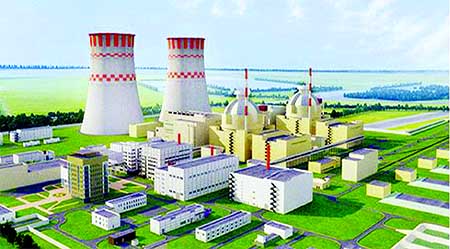
Anisul Islam Noor, back from Ishwardi :The first phase of Rooppur Nuclear Power Plant (RNPP) is scheduled to start its trial operation from August 1, 2017. Meanwhile, 80 per cent of its infrastructure development has been completed. Secretary of the Ministry of Science and Technology Md Sirajul Hoque Khan disclosed this to a group of visiting journalists at the plant site at Rooppur in Ishwardi of Pabna district on Saturday.He said, Commissioning of the first unit is scheduled to be held in early 2019. Provisional take over of the first phase will be held in 2023 while the second phase in 2024 from Rosatom, a Russian nuclear firm which is implementing the project. Regarding a question, Khan said the sustainability of the plant would 50 years and could be extended by another 30 years.The second unit of the plant will come into trial operation in the middle of 2019 and its final taking over ceremony will be by the end of 2025.Five layer safety measures have also been in the plant along with the reactor, said Engineer M. Ali Zulquarnain, Chairman of Bangladesh Atomic Energy Commission (BAEC).Primarily fixed cost of the project is US$13.2 billion (equivalent to Tk 101,200 crore of which 90 per cent is funded as loan by the Russian government.Bangladesh has to pay back the loan in the next 28 years with an eight-year grace period. In 2009, the Bangladesh government again started discussion with the Russian government regarding the setting up of the nuclear power plant. In February, 2010, the two governments signed a memorandum of understanding. Rosatom, the Russian firm had started the construction work by 2013.In 2013, a group of Bangladeshi scientists and the global diaspora voiced profound concern over the safety and economic viability of the plant. Several issues were raised from the unsuitability of the site to the obsolescence of the VVER-1000 model [citation needed] proposed, questionable financing arrangements and a lack of agreement with Russia over nuclear waste disposal.In 2015, the government has decided to install VVER-1200 in consultation with Rosatom which is third generation plus Water-Water-Energy-Reactor model with a capacity of generating 2=2400MW electricity. Sources said, ground preparation work of the plant commenced in 2016. The two units generating 2.4 GWe are planned to be operational in 2023 and 2024 respectively. Rosatom will operate the units for the first year before handing over to Bangladeshi operators. Russia will supply the nuclear fuel and take back spent nuclear fuelBy December 2015, the estimated cost of the plant had climbed to US$13 billion, from statements of around US$4 billion made earlier in the same year. Transparency International Bangladesh expressed concern on December 28, 2015 about the safety of the proposed plant, stating “Even reputed Russian environmentalists consider Russian nuclear reactors unsafe”.The proposal was made in 1961. Government took 253.90 acres of land in that year to build the plant. In 1963 the plant was approved. Discussions took place with the Canadian government in 1964 and 1966. Discussions with the governments of Sweden and Norway were held in those years.

